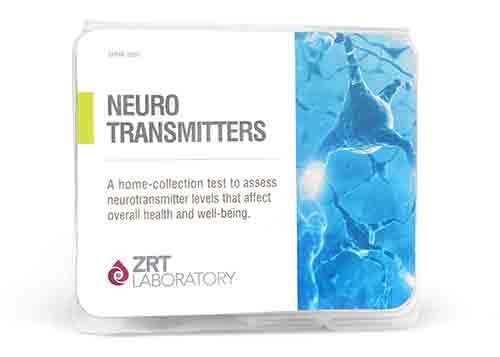NEUROTRANSMITTERS
Learn if you’re in the 86% of Americans who have suboptimal neurotransmitter levels.
Neurotransmitters are chemical messengers used by the nervous system to relay information from one nerve to another.
Optimal neurotransmitter balance is required to maintain proper health. Imbalances can cause the brain and the body to be over- or under-stimulated, producing neurological or psychological symptoms.
ZRT has determined that while parent neurotransmitters are helpful in assessing precursor availability, interpreting results based on those levels alone can result in undertreatment, treatment of the wrong part of the system, or overtreatment with direct precursors. It’s only by looking at the parent neurotransmitters with downstream metabolites that you can tell whether there is a systemic pattern.
Given the importance of these levels to correct interpretation of neurotransmitter results and subsequent treatment plans, ZRT Laboratory includes a range of 14 neurotransmitters and metabolites in its testing. This essential collection of tests is available only from ZRT – and not from any other lab.
Blog: Monoamine Metabolites – An Essential Factor In Understanding Neurotransmitters
Genetics, environment, chemicals and nutritional deficiencies are a few factors that can impact neurotransmitter production. Once out of balance, the nervous system begins to compensate – which, in time, can lead to neurological or psychological symptoms.
Some of the more common psychological conditions today are known to be accompanied by neurotransmitter imbalances. However, it’s also possible for individuals to present with similar symptoms yet have unique foundational imbalances. Testing helps clarify these root issues.
Common neurotransmitter-related causes of health issues often involve the following scenarios:
Neurotransmitter imbalances are often associated with anxiety and depression, specifically Glutamate (panic attacks), PEA, Histamine, Serotonin, as well as Epinephrine & Norepinephrine. Learn how Epinephrine & Norepinephrine affect chronic stress.
An imbalance between excitatory and inhibitory neurotransmitters can lead to persistent fatigue.
GABA, Dopamine and Serotonin are three chemical messengers commonly linked to disorders like ADD, ADHD & OCD.
Imbalances in Glutamate, Histamine, Dopamine, GABA and Serotonin are often linked to sleep disturbances and insomnia.
Imbalances in Serotonin, Dopamine, Norepinephrine and GABA are often involved in cases of PMDD (pre-menstrual dysphoric disorder) and severe PMS.
In the neurological system, hormones are synergistic with neurotransmitters – modulating their production, signaling and metabolism. Because of this complex interplay, testing hormones and neurotransmitters together is an ideal way to generate a more precise clinical assessment.
This combined testing gives practitioners a diagnostic edge over the traditional psychological inventory and offers the advantage of zeroing in on which therapies are best suited for individual patients – cutting down on the time-consuming process of trial-and-error for identifying treatment options.
Heavy metals are damaging to brain health. They disrupt neurotransmitter function and create oxidative stress that is detrimental to nerve cells, contributing to mood disorders, poor memory and dementia. Identifying exposure to heavy metals may be key to assessing and treating mood disorders and preventing neurodegenerative diseases.
In contrast, nutritional elements are generally protective for brain health. Lithium acts directly on the brain by slowing the progression of dementia and stabilizing mood, while elements like iodine and selenium act indirectly by supporting healthy thyroid and brain function.
ZRT is the only lab to offer a 24-hour equivalent in four easy collections – resulting in a more accurate assessment of individual neurochemistry.
ZRT’s dried urine method offers a discreet, at-home testing alternative and eliminates the hassles of all-day jug urine collection. Patients collect urine on a filter strip up to four times during the day. Dried strips are shelf-stable for 30 days and easy to mail back to the lab for analysis.
Recommended for Practitioners:
Webinar: The Nuts and Bolts of Neurotransmitter Testing
Webinar Case Studies: Interpreting Neurotransmitter Reports
Datasheet: Neurotransmitter Testing in Dried Urine
Recommended for Patients:
Webinar: Is the Neurotransmitter Test Right for You?
Patient Handout: Neurotransmitter Testing
Blog: Testing Neurotransmitters? Avoid the Big 5.
To restore the vital balance of neurotransmitters, we first need a detailed, accurate measurement of their levels. Not just numbers, but an assessment that offers real meaning.
ZRT Test Directory & Abbreviations
Neurotransmitters Reference Ranges


